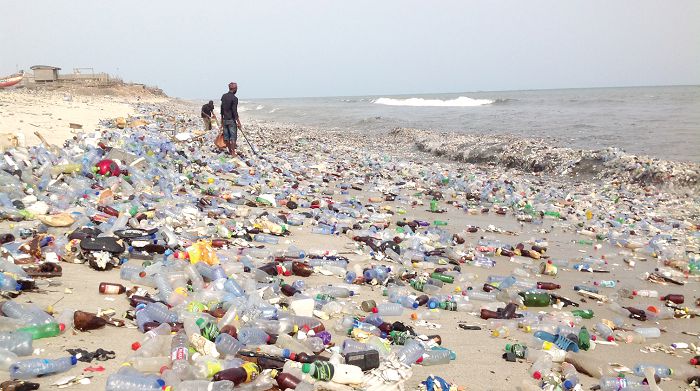By 2050, plastic waste in the oceans will be more than the fishes, a report from the Ellen MacArthur Foundation, in partnership with the World Economic Forum, has predicted.
The report, published in 2017, says part of the reason for the forecast is that plastic use has increased 20-fold in the last 50 years, and is continuing to rise, while many plastics are not reused, causing them to go into landfills that can then pollute the oceans.
Since the plastic revolution hit Ghana some years ago, almost everything — edible and non-edible — has been packaged in plastic, with about 70,000 plastic bottles, often referred to as PET (polyethylene terephthalate), being produced every month.
Nonetheless, not much has been done to see to the effective management of the waste generated once the products have been used, except for the numerous stakeholder engagements on how to deal with the menace.
Managing plastics has, therefore, become a hydra-headed problem for the country, with many environmentalists and Ghanaians calling for something drastic to be done to reverse the trend.
The debate has moved in circles, with calls for recycling, effecting the polluter pays principle and a total ban on the use of plastics, as has been done by countries such as Rwanda, dominating the discourse.
Manufacturers and importers of plastic products have, for their part, cried wolf, saying that although the government charges them 10 per cent Environmental Excise Tax (EET) to manage the plastic waste, that has not happened.
According to the Chairman of the Plastic Waste Management Programme, Mr Ebbo Botwe: “As per the law that established the 10 per cent EET, proceeds from the 10 per cent EET are supposed to be lodged in a special fund.”
He stated that the National Environmental Fund Authority for Plastic Waste Management was intended “to support relevant plastic waste management initiatives, especially plastic waste recycling in the country, but, sadly, to this day the fund authority has not been set up and proceeds from the 10 per cent EET, which runs into several hundreds of thousands in Ghana cedis, have been diverted into the Consolidated Fund”.
The Daily Graphic believes that if the country is serious with fighting the plastic waste menace, then the Environmental Fund must be set up without further delay and the authority to manage it established to ensure that the taxes collected, which conservative estimates put at about GH₵1 billion, are not misapplied but used for the intended purpose.
Setting up of the fund will encourage more manufacturers and producers of beverages, food and other items who use plastic packaging, especially PET bottles, to pay the EET. It will also create employment, as various activities will be lined up to ensure that the environment is rid of plastic waste.
As things stand now, we are of the view that putting the EET in the Consolidated Fund does not augur well for us as a country, since that fund is a common pot from which funds are taken for all sorts of purposes.
We commend the government for playing the lead role in developing a National Plastics Management Policy that is currently before the Cabinet to help arrest the overwhelming plastic waste situation.
The Daily Graphic, however, urges the fast-tracking of the processes that will lead to the policy becoming operational.
That is the only way we can effectively deal with the plastic menace and make our environment safe for everyone.

